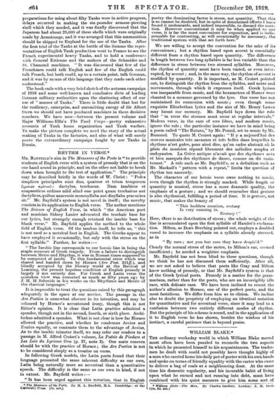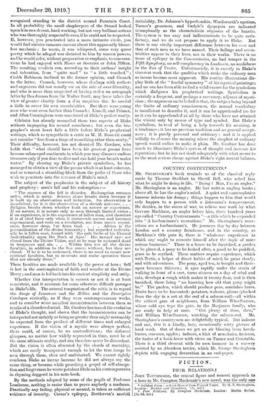WILLIAM BLAKE.*
THE ordinary workaday world in which William Blake moved must often have been puzzled to reconcile the two aspects in which he presented himself to his acquaintances. The trades. men he dealt with could not possibly have thought highly of a man who carried home his daily pot of porter with his own hands and spoke on terms of friendly equality with the carter who cam to deliver a bag of coals at a neighbouring door. At the same time his domestic regularity, and his incurable habit of living upon what he earned and not running into debt, must have combined with his quiet manners to give him some sort of • William Blake—The Man. By Charlea Gardner. London 3. M. Bent. 110s. Od. net.]
recognized standing in the district around Fountain Court. In all probability the small shopkeepers of the Strand looked upon him as a decent, hard-working, but not very brilliant artisan who was thoroughly respectable even if he could not be respected. If, however, you penetrated into a more intimate circle, you would find sinister rumours current about this apparently blame- less mechanic : ho wrote, it was whispered, some very queer poetry which he alleged was dictated to him by unseen powers, and he would refer, without preparation or emphasis, to conversa- tions he had enjoyed with Moses or Socrates or John Milton.
The resulting verdicts ran, according to their authors' insight and toleration, from " quite mad " to " a little touched " ; Crabb Robinson inclined to the former opinion, and Cromek to the latter. Cromek, however, whose dealings with authors and engravers did not usually err on the side of over-liberality, and who is more than suspected of having stolen an autograph letter by Ben Jenson from Sir Walter Scott, may have taken the view of greater charity from a, d:in suspicion than he needed a little to cover his own eccentricities. But there were young mon who went even further than Cromek Liman, and Palmer, and Allan Cunningham were convinced of Blake's perfect sanity.
Gilchrist has already reconciled these two aspects of Blake without impugning his mental soundness ; but even the bio-
grapher's stout heart fails a little Wore Blake's prophetical writings, which so sympathetic a critic as W. M. Rossetti could not consider "free from a tinge of something other than sanity."
Their difficulty, however, has not daunted Mr. Gardner, who holds that " what should have been his greatest poems have become submerged continents in which you may discover endless treasures only if you dare to dive and can hold your breath under water." By clearing up Blake's private symbolism, he has managed to obtain a view of the poems which is at least coherent, and so removed a stumbling-block from the paths of those who wish to penetrate into the recesses of Blake's mind.
The subject of tho prophecies is the subject of all history and prophecy : man's fall and his redemption :-
" The essence of the fall is disorder. Redemption restores order, which is unity. Science alone breaks down because it is built up on observation and induction. Its observation is insufficient, for it is the observation of u, shrunk universe. . . . Religion breaks down whether built on nature or experience. If on nature, it is nature only as seen through limited vision ; if on experience, it is the experience of fallen man, and therefore it is of vital force only when it transcends nature and becomes supernatural, and rests on a revelation, not from man's experi- ence, however deep, but from God. . . . Albion is the personification of the divine humanity ; but regarded individu- ally ho is fallen man, bound with ' the pale limbs of his Eternal Individuality upon the Rock of Ages.' His inward eyes; are closed from the Divine Vision, and so he may be reckoned dead in trespasses and sin. . . . Within him are all the divine faculties, in addition to the five senses without, but they are closed. If he is to be redeemed, there is no need to create new spiritual faculties, but to re-create and make operative those that are already there."
These faculties are made available by the power of love ; Self is lost in the contemplation of faith and wonder at the Divine Mercy; and man is led back into his ancient simplicity and unity.
Whether this interpretation is correct or not it is at least consistent, and it accounts for some otherwise difficult passages
in Blake's life. The natural temptation of the critic is to regard the Songs of Innocence and the Milton and the Descriptive Catalogue statically, as if they were contemporaneous works,
and to consider some manifest inconsistencies between them as marks of a disordered mind. Mr. Gardner has traced the evolution of Blake's thought, and shown that the inconsistencies can be interpreted not unfairly as being no greater than might reasonably be expected from the product of different times and enlarged experience. If the vision of a mystic were always perfect,
there could, of course, be no contradictions ; the different glimpses, no matter how widely separated in time, must be of the same ultimate reality, and can therefore never be discordant. But the vision is often obscured by the clouds of mortality, which arc rarely transparent enough to let the true image be seen through them, clear and undistorted. We cannot rightly condemn Blake as insane because he did not always say the same thing, or because while preaching a gospel of self-abnega- tion and forgiveness he wrote petulant libels on his contemporaries in rhyming doggerel in his note-book.
By the methods adopted by some of the pupils of Professor Lombroso, nothing is easier than to prove anybody a madman..
Practically any failing, physical or mental, is taken as sufficient evidence of insanity, Caesar's epilepsy, Beethoven's morbid
irritability, Dr. Johnson's hypochondria, Wordsworth's egotism, Turner's grossness, and Carlyle's dyspepsia aro indicated triumphantly as the characteristic stigmata of the lunatic. The system is too easy and indiscriminate to be quite satis- factory, and we do not propose to apply it to Blake. But there is one vitally important difference between his case and that of such men as we have named. Their failings and eccen- tricities appear in their lives, not in their works. There is no trace of epilepsy in the Commentaries, no bad temper in the Fifth Symphony, no self-complacency in Laodamia, no sordidness in the Sun of Venice. Unfortunately, it is exactly in Blake's sincerest work that the qualities which strike the ordinary man as insane become most apparent. His routine illustrations dis- play little of the " fearful symmetry " of his mystical paintings; and no one has been able to find a valid excuse for the symbolism which disfigures his prophetical writings. Symbolism is certainly a frequent, and perhaps a necessary, adjunct of mysti- cism ; the argument on its behalf is that, the subject being beyond the limits of ordinary consciousness, the normal vocabulary is' insufficient to describe it, and it can be apprehended (so far as it can be apprehended at all by those who have not attained the vision) only by means of type and symbol. But Blake's symbolism, instead of being a help towards his meaning, is a hindrance ; it has no previous tradition and no general accept- ance ; it is purely personal and arbitrary ; and it is applied wilfully to obscure the meaning where the simplest of ordinary speech would suffice to make it plain. Mr. Gardner has done much to illuminate Blake's system of thought and increase his reputation; but he has not dealt adequately with what seems to us the most sericus charge against Blake's right mental balance.







































 Previous page
Previous page